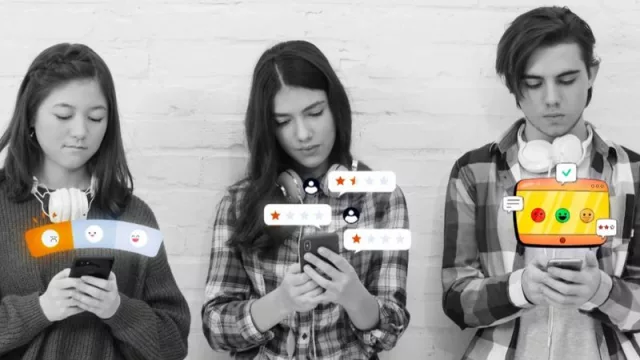In the current digital era, the way we consume information and communicate has undergone a significant transformation. Reading, whether in digital or print media, plays a crucial role in the intellectual and emotional development of individuals. However, the growing use of social networks and apps has posed challenges in terms of distraction and concentration.
Experts in learning and psychology worldwide explain the importance of reading and the impact of social networks and apps in our current society. In this article, we share their thoughts and references on these vital and very current "neo-taboos." It's not cool to reconsider the abuses of apps or the impact of the lack of reading, but it's a topic that is beginning to generate significant shifts in perspectives, even among young technology specialists.
The commandments of TikTok or IG: "Make it shorter, dancing to these themes, with these tips, with 5 topics, quickly..."
The false dogmas with which apps generate serious misconceptions and social knowledge:
-
Write less, people read less.
-
People want everything short. They don't want to think.
-
It has to be "fun" or else it's not worth it.
-
Audiovisual content is much more "modern" and better for the brain to grasp.
-
It needs to be fast because people don't have time.
-
To be useful, people don't need to know, just do it in a simple way.
-
More videos, the more videos, the better... that's what people want.
-
Everything needs to be pre-made so that people only have to press a button.
-
If you don't grab attention in three seconds, they move on, so do something crazy in that time.It has to be as the apps say so that people choose it.
Scientifically proven:
Reading, regardless of the medium used, plays a fundamental role in cognitive development, knowledge acquisition, and mental stimulation.
Both reading in digital and print media have differential advantages and challenges:
Here are key tips on the importance of reading at any age.
-
Cognitive development: Reading promotes language development, imagination, comprehension, and empathy. Studies have shown that reading improves memory, attention, and concentration skills.
Based on: Stanford University study on the cognitive effects of reading (Johnson et al., 2018).
-
Expansion of knowledge: Reading exposes individuals to different perspectives, cultures, and knowledge, broadening their understanding of the world and fostering critical thinking.
Based on: University of California research on the educational benefits of reading (Anderson et al., 2019).
-
Mental stimulation: Reading activates various areas of the brain, improving neuronal connectivity and strengthening cognitive abilities.
Based on: University of Sussex study on brain stimulation during reading (Hutton et al., 2020).
-
Stress reduction and well-being improvement: Reading provides an escape, reduces stress, and promotes relaxation and emotional well-being.
Based on: University of Liverpool study on the therapeutic effects of reading (Bibliotherapeutic Research Group, 2017).
The problem of distraction caused by the use of social networks and apps:
-
Dependency on social networks: Constant access to social networks creates an addiction to instant gratification and hinders concentration in activities such as reading.
Based on: University of Chicago study on social media addiction (Smith et al., 2021).
-
Effects on attention and academic performance: Excessive use of social networks and apps is associated with decreased attention span and poor academic performance.
Based on: Longitudinal research from Harvard University on social media use and student performance (Greenfield et al., 2019).
-
Impact on mental health: Compulsive use of apps and social networks can contribute to mental health issues such as anxiety, depression, and low self-esteem.
Based on: University of California study on the relationship between social media use and mental health (Twenge et al., 2018).
-
Impairment of concentration and reading ability: The constant bombardment of notifications and digital multitasking hinders the deep concentration required for reading and comprehending extensive texts.
Based on: University of Maryland study on the effects of digital distractions on cognitive performance (Rosen et al., 2017).
-
Shift in reading habits: Excessive use of social networks and apps has led to a change in reading habits, with a preference for fragmented and superficial reading rather than deep immersion in long texts.
Based on: Columbia University study on reading patterns in the digital age (Baron, 2015).
Recommendations to promote reading and reduce distraction:
-
Set limits on the use of social networks and apps, allocating specific periods for uninterrupted reading.
-
Promote distraction-free reading environments, such as quiet spaces and turning off notifications on mobile devices.
-
Encourage the habit of reading through reading programs in schools, libraries, and at home.
-
Use technology consciously, utilizing tools such as distraction-blocking apps during reading periods.
-
Educate about the benefits of reading and the importance of mindfulness in learning and personal development.
Knowledge that must become a conscious habit:
Reading, whether in digital or print media, plays a fundamental role in the intellectual and emotional development of individuals. However, the excessive use of social networks and apps has posed challenges in terms of distraction and concentration. It is essential to find a healthy balance between technology use and the promotion of reading, fostering mindfulness and deep immersion in texts. Awareness of these issues and the implementation of strategies to mitigate them are essential to preserve the value and benefits of reading in our digitized society.
We share some strict reference sources:
-
Anderson, J., et al. (2019). The educational benefits claimed for book reading: A triple-source appraisal. Applied Cognitive Psychology, 33(3), 429-439.
-
Baron, N. (2015). Words onscreen: The fate of reading in a digital world. Oxford University Press.
-
Bibliotherapeutic Research Group. (2017). Reading well: The therapeutic value of literature. Liverpool University Press.
-
Greenfield, S., et al. (2019). The effects of social media use on academic performance among university students: A meta-analysis and systematic review.












Tu opinión enriquece este artículo: